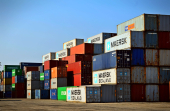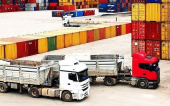A business carrier, often referred to simply as a "carrier," is a company or individual responsible for transporting goods or passengers from one location to another. Carriers play a crucial role in the logistics and supply chain industry, ensuring that products and people move efficiently and safely.
There are different types of carriers, each specializing in various modes of transportation:
Types of Business Carriers
1. Freight Carriers:
- Truck Carriers: Transport goods by road using trucks and trailers. Examples include local delivery services and long-haul trucking companies.
- Rail Carriers: Use trains to move large quantities of goods over long distances. Rail transport is often used for bulk items like coal, grain, and chemicals.
- Maritime Carriers: Transport goods by sea using cargo ships. This includes container ships, bulk carriers, and tankers.
- Air Carriers: Use airplanes to move goods quickly over long distances. Air freight is typically used for high-value or time-sensitive items
2. Passenger Carriers:
- Airlines: Transport passengers by air. Airlines operate flights on various routes and offer different service levels, from economy to first class.
- Bus Companies: Provide ground transportation for passengers over short and long distances.
- Railway Companies: Transport passengers by train, offering services from local commuter trains to long-distance and high-speed trains.
- Ferry Services: Transport passengers and sometimes vehicles across bodies of water.
Responsibilities of Business Carriers
- Transporting Goods/Passengers: The primary responsibility is to move goods or passengers from the point of origin to the destination.
- Maintaining Safety: Ensuring the safety of goods or passengers during transport.
- Managing Logistics: Handling logistics, including scheduling, routing, and coordinating with other transport modes.
- Issuing Transport Documents: Providing necessary documents such as bills of lading, air waybills, or passenger tickets.
- Compliance with Regulations: Adhering to industry regulations and standards, including customs and import/export laws for international shipping.
- Providing Customer Service: Offering support to customers, including tracking shipments and handling inquiries or issues.
Role in Supply Chain
Business carriers are integral to the supply chain, facilitating the movement of raw materials to manufacturers, finished goods to distributors and retailers, and ultimately to end consumers. Their efficiency and reliability directly impact the overall performance of the supply chain.
In summary, business carriers are essential for ensuring the smooth and efficient transport of goods and passengers, supporting global trade, and enabling businesses to reach markets and customers effectively.
A business forwarder, often referred to as a freight forwarder, is a company or individual that organizes the shipping and transportation of goods on behalf of a business or individual. They act as intermediaries between the shipper and various transportation services, such as shipping lines, airlines, and trucking companies.

Here are some key functions of a business forwarder:
1. Logistics Planning : They plan and coordinate the most efficient and cost-effective route for the shipment.
2. Documentation: They handle all necessary documentation, including bills of lading, customs documents, and insurance.
3. Customs Clearance**: They assist with customs clearance, ensuring that shipments comply with all relevant regulations and taxes are paid.
4. Warehousing: They may provide temporary storage solutions for goods like carpet in transit.
5. Consolidation and Deconsolidation: They can consolidate multiple smaller shipments into one larger shipment to reduce costs or deconsolidate a larger shipment into smaller ones for final delivery.
6. Insurance : They can arrange for insurance to protect the goods during transit.
7. Tracking: They provide tracking services to keep clients informed about the status and location of their shipments.
Business forwarders are essential for companies involved in international trade, as they simplify the complex process of shipping goods across borders and help navigate the regulatory landscape.
Business carriers, also known as commercial carriers or transportation carriers, are companies that transport goods or passengers.

They come in various types, each specializing in different modes of transportation. Here are some of the main kinds:
1. Air Carriers:
- Passenger Airlines: Transport people and their luggage.
- Cargo Airlines: Specialize in transporting goods and freight.
2. Sea Carriers :
- Container Ships : Transport goods in large, standardized containers.
- Bulk Carriers: Carry unpackaged bulk cargo, such as grains, coal, or ore.
- Tankers: Transport liquid cargoes like oil, chemicals, or liquefied natural gas (LNG).
- Roll-on/Roll-off (RoRo) Ships: Designed to carry wheeled cargo like cars, trucks, and trailers.
3. Land Carriers:
- Trucking Companies: Transport goods over land via trucks. They can be further categorized into:
- Less Than Truckload (LTL): Combine shipments from multiple customers in one truck.
- Full Truckload (FTL) : Carry a full truckload of goods from one customer.
- Rail Freight Carriers: Transport goods over long distances using trains. Commonly used for bulk goods like coal, steel, and agricultural products.
4. Multimodal/Intermodal Carriers:
- These carriers use a combination of transportation modes (e.g., truck, rail, sea) to move goods from origin to destination. Containers are often used to simplify the transfer between different modes.
5. Courier and Express Services :
- Companies like FedEx, UPS, and DHL offer fast, reliable delivery services for documents and small parcels, often providing door-to-door service.
6. Pipeline Carriers :
- Specialized in transporting liquids and gases, such as oil, natural gas, and chemicals, through pipelines.
7. Specialized Carriers:
- Heavy Haul Carriers: Transport oversized and heavy items, such as construction equipment and machinery.
- Automotive Carriers: Transport vehicles using specialized trucks or trains.
- Perishable Goods Carriers : Use refrigerated trucks, ships, or planes to transport perishable items like food and pharmaceuticals.
Each type of carrier has its own strengths and is chosen based on the specific needs of the shipment, including factors like cost, speed, and the nature of the goods being transported.
Business forwarders, also known as freight forwarders, come in various types, each specializing in different aspects of logistics and transportation. Here are some of the main types of business forwarders:
1. Air Freight Forwarders :
- Specialize in organizing and coordinating air cargo shipments. They work closely with airlines to ensure timely and efficient transportation of goods by air.
2. Ocean Freight Forwarders :
- Focus on shipping goods by sea. They handle tasks such as booking cargo space on vessels, preparing shipping documentation, and managing customs clearance for maritime shipments.
3. Land Freight Forwarders:
- Specialize in ground transportation, including trucking and rail freight. They coordinate the movement of goods overland, often handling domestic shipments or the land segment of international shipments.
Each type of business forwarder offers specialized services tailored to the specific needs of different types of cargo, industries, and transportation modes. Their expertise ensures efficient and compliant shipping solutions for a wide range of goods.